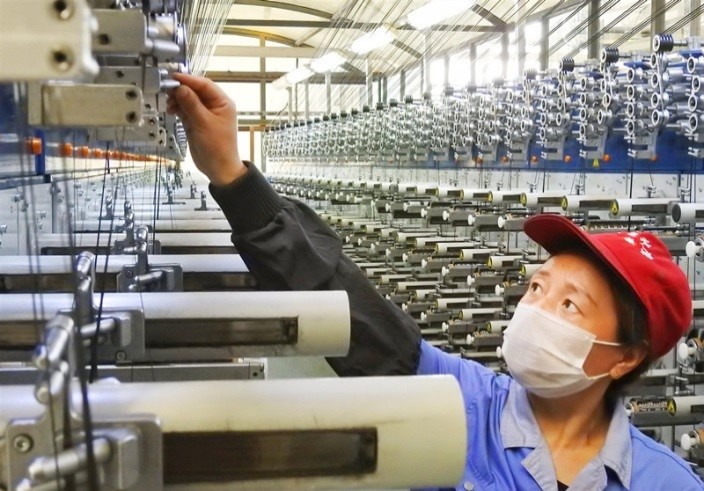By XieJun (Global Times)09:59, July 02, 2019![]()

On June 27, 2019, in the Economic and Technological Development Zone of Lianyungang, Jiangsu Province, workers saw the operation on the carbon fiber production line. (Photo by Geng Yuhe from People’s Daily Online)
China’s economy is stabilizing with latest statistics pointing toward a mild rebound in May, as domestic companies strive to shake off the negative impact of the China-US trade war through internal improvements and flexible business strategies.
According to data released by the National Bureau of Statistics (NBS) on June 27, above-scale industrial companies, referring to companies whose annual main business revenues are no less than 20 million yuan ($2.9 million), saw their profits grow 1.1 percent on a yearly basis in May, turning from a 3.7 percent contraction in April.
“There’s a rebound in the industrial sector, albeit not a very strong one, mirrored by narrowing industrial profit declines in recent months,” Liu Xuezhi, an economist at Bank of Communications, told the Global Times on June 27.
For the year to date, profits of above-scale industrial enterprises still declined, but at a slower pace. Profits fell 2.3 percent on a yearly basis in the first five months of this year, compared with 3.4 percent in the first four months, 3.3 percent in the first three months and 14 percent in the first two months.
Certain industries in particular are experiencing a warm-up. For example, profits of the electronics machinery industry grew 19.7 percent in May, according to the NBS data.
The coal mining industry’s profits also grew 20.3 percent in May, the data showed.
Faced with tariff increases imposed by the US government, China’s manufacturing sector has been focusing efforts on economic transformation, shifting from mass exports of low-end products to production of items with higher added value, experts said.
“With technological advantages, Chinese companies have strong market appeal Their products have few substitutes and are thus immune to external tariff changes,” Li Chunding, a professor at the College of Economics and Management under the China Agricultural University, told the Global Times on June 27.
According to the NBS data, above-scale high-tech manufacturers’ profit expanded 6.2 percent in May, compared with 15.1 percent slide in April, while strategic emerging industries grew 6.7 percent year-on-year in May, compared with an 8.4 percent decline in April.
Apart from industrial upgrading, some Chinese traders are also shifting to domestic markets or markets other than the US.
Several traders in Yiwu, the renowned marketplace in East China’s Zhejiang Province, told the Global Times that they are starting to tap the importing markets seeing the huge market potentials and the government call for imports.
Of the provinces that have released January-May trade data, South China’s Hainan Province had the fastest growth of 41.7 percent while South China’s Guangdong Province had the largest trade value of 2.71 trillion yuan.
Yang Chang, an economist at the research center of Zhongtai Securities, said that the continuity of China’s industrial rebound “is yet to be seen.” Pressure continues due to such factors as low profit margins and weak corporate liquidity, he wrote in a statement sent to the Global Times on June 27.


